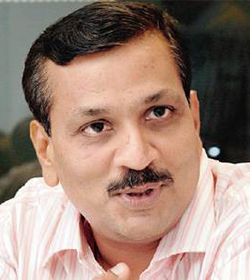In an interview with Cafemutual, P V K Mohan, Head of Equity, Principal Mutual Fund shares his views on what markets can expect post the formation of new government.
 Many fund managers are moving away from FMCG sector. What is your view on this sector?
Many fund managers are moving away from FMCG sector. What is your view on this sector?
Post elections the opportunity to make money in other sectors which were beaten down has improved. The beneficiaries will be the cyclical stocks. Mutual funds are not getting new money. So within the existing portfolio they are reallocating. They are reducing exposure from defensive sectors like IT, pharmaceutical and FMCG and moving to cyclical stocks.
Did you also reduce exposure in defensive stocks?
We were underweight on FMCG for more than a year now. Our philosophy is that we buy companies which have a good prospect for three years and we buy it on valuations where we can make money. The concern regarding FMCG was on valuation. While the earnings in FMCG sector were growing barely double digit the PE multiples were around 35. In such a situation it becomes a challenge to make money.
Principal Growth Fund made it to the CRISIL top ranking in March 2014 quarter. What worked in your favour?
It has a mix of large caps (75%) and mid-caps (25%). The bottom-up calls taken by us worked well for the fund. We increased exposure to high-beta stocks. We bought mid-cap pharmaceutical stocks which did extremely well. We were underweight on financials and consumer stocks for a long time. We were overweight on IT. From an all-time high of 15%, pharmaceuticals is now barely 3%. We moved to high beta and cyclical companies.
How is Principal Personal Tax Saver Fund different from Principal Tax Savings Fund?
The portfolio of PTSF portfolio is aligned towards our large cap fund whereas Principal Tax Savings Fund tries to replicate the portfolio of our diversified fund.
Have you seen any redemption pressure in your equity funds after the market run up?
We have seen some inflows in our equity schemes of late. We were facing redemptions in 2013 and early 2012.
Have your shuffled your portfolios after the formation of new government? Which sectors do you think will play out well in the next three years?
We have increased exposure towards oil & gas and financials. We intend to be overweight on cement. Now our effort is to be more stock specific. The idea is to focus on stocks which can give outsized returns than the general market. The sectoral changes are already done. Today allocation towards sub Rs. 3,000 crore companies is on the rise.
What are the next triggers for the market?
The next trigger is cabinet formation and secondly the budget. These two will play an important role. Once cabinet is formed, we will be looking for what kind of policy decision government starts to take. Good monsoon can also be a positive for the market. Apart from domestic triggers, international triggers can impact FII inflows.
Along with equity funds, investors are pulling out from balanced funds. How do you see this balanced fund category panning out?
Balanced funds have fixed allocation. Balanced funds form a part of asset allocation. Asset allocation takes a backseat in a wildly bullish market. Balanced funds will always have a role in the investor’s portfolio.
Are PE Funds better positioned to participate in rally?
Yes. Our PE fund has done extremely well. PE funds work well if you have three year horizon and if you are near a cycle. PE funds have flexibility as compared to balanced funds. PE funds are not promoted by distributors in a big way. A PE fund is the best all seasons product. PE fund are suited for slightly risk-averse investors.
Many fund houses have hiked expense ratios in their equity funds. Have you also hiked the expense ratios in your funds? If yes, how do you see the impact on returns over the long term?
I don’t think we have hiked our expense ratios. Some AMCs are doing it opportunistically. The presumption is that if the fund is delivering 20% return then investors may not mind paying 0.5% extra fee. If expense ratio goes up fund managers have to perform better. They have to beat their peers who charge a lower expense ratio.
What is your view on interest rates?
We think the rates will be hovering at the current levels for the next three to six months. We don’t see any rate cuts until the consumer price inflation (CPI) falls below 6%. Rate hikes may not happen immediately. The RBI governor would like to see what government does to address the supply side issues.
Do you think fund houses are fulfilling their responsibility towards ensuring corporate governance in investee companies?
Earlier, mutual funds were abstaining from voting. Now they are beginning to play an active role in corporate governance which was evident in the recent Maruti episode. While mutual funds are still a small part of the market, we can still play an important role in influencing management decisions. Even if companies go against shareholders decision they do come back to market to borrow. That time the company will be taken to task.
Your advice to budding fund managers…
One should understand the business threadbare. It doesn’t start with reading annual reports. One should go to company’s plants and meet people there. One should have a curiosity to understand the business. You should be able to convert your thesis into buyable recommendation. It is important to revisit your assumptions at regular intervals. Risks should not come with taking unduly high risks.
One book which would recommend to all investment professionals…
For a novice investor I would recommend reading Benjamin Graham’s books. It teaches you how to look at intrinsic value of companies. For my peers, I would recommend reading Warren Buffet’s newsletters. I also liked Aswath Damodaran’s book on Valuation.




